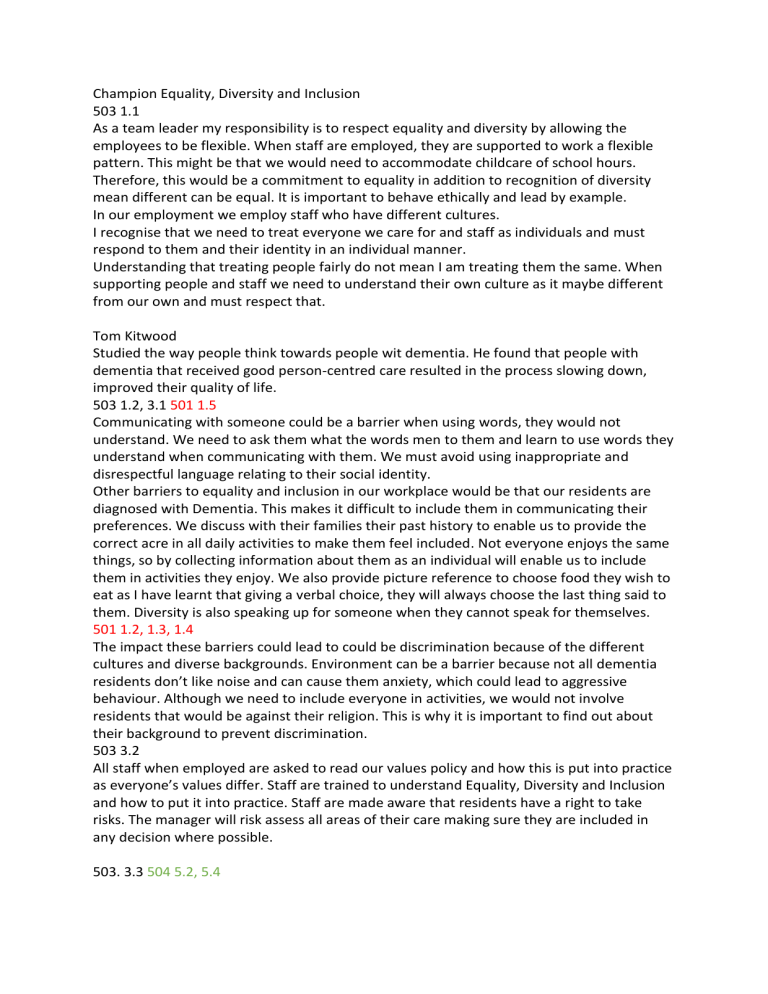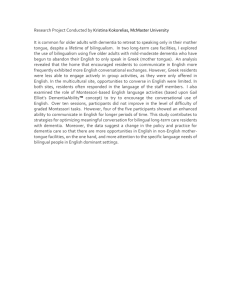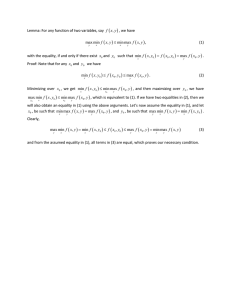
Champion Equality, Diversity and Inclusion 503 1.1 As a team leader my responsibility is to respect equality and diversity by allowing the employees to be flexible. When staff are employed, they are supported to work a flexible pattern. This might be that we would need to accommodate childcare of school hours. Therefore, this would be a commitment to equality in addition to recognition of diversity mean different can be equal. It is important to behave ethically and lead by example. In our employment we employ staff who have different cultures. I recognise that we need to treat everyone we care for and staff as individuals and must respond to them and their identity in an individual manner. Understanding that treating people fairly do not mean I am treating them the same. When supporting people and staff we need to understand their own culture as it maybe different from our own and must respect that. Tom Kitwood Studied the way people think towards people wit dementia. He found that people with dementia that received good person-centred care resulted in the process slowing down, improved their quality of life. 503 1.2, 3.1 501 1.5 Communicating with someone could be a barrier when using words, they would not understand. We need to ask them what the words men to them and learn to use words they understand when communicating with them. We must avoid using inappropriate and disrespectful language relating to their social identity. Other barriers to equality and inclusion in our workplace would be that our residents are diagnosed with Dementia. This makes it difficult to include them in communicating their preferences. We discuss with their families their past history to enable us to provide the correct acre in all daily activities to make them feel included. Not everyone enjoys the same things, so by collecting information about them as an individual will enable us to include them in activities they enjoy. We also provide picture reference to choose food they wish to eat as I have learnt that giving a verbal choice, they will always choose the last thing said to them. Diversity is also speaking up for someone when they cannot speak for themselves. 501 1.2, 1.3, 1.4 The impact these barriers could lead to could be discrimination because of the different cultures and diverse backgrounds. Environment can be a barrier because not all dementia residents don’t like noise and can cause them anxiety, which could lead to aggressive behaviour. Although we need to include everyone in activities, we would not involve residents that would be against their religion. This is why it is important to find out about their background to prevent discrimination. 503 3.2 All staff when employed are asked to read our values policy and how this is put into practice as everyone’s values differ. Staff are trained to understand Equality, Diversity and Inclusion and how to put it into practice. Staff are made aware that residents have a right to take risks. The manager will risk assess all areas of their care making sure they are included in any decision where possible. 503. 3.3 504 5.2, 5.4 When evaluating the workplace, the next stage would be to decide on what action need to be taken to address any gaps or shortfalls in the system and process. I would then need to produce an action plan which should detail how improvements will be made and a timescale for any changes recorded to take place. All staff will be made aware of their own roles and responsibilities with implementing any changes. By involving the staff will enable then to use their strengths and support management with improving the service. 503 4.1 If a conflict arises, I am not permitted to force a resident or a staff member to do or not do something about it unless our policy allows me to. Within my job roll if a conflict arises between two residents. (for example, one trying to help another with mobolising). I would support them by being very supportive and in an encouraging way providing any information about the risk involved and that it wasn’t safe for them both. Every time a conflict arises, I am required to record what action was taken and seek advice from my manager. 503 4.2 517 1.4 Informed choice is a pre-condition of informed consent. Informed choice emphasises the autonomy of the individual and involves respect and rights of the individual to make decisions about actions that affect them. What care is “reasonable” and “right” to deliver to the resident. 503 4.3 517 1.3 It is defined in the law of the Mental Capacity Act as a person may lack capacity in relation to a matter and is unable to make decisions for themselves because of an impairment or a disturbance in the brain Function. A person who lacks capacity weather permanent or temporary will not have the ability toUnderstand information given to them Weigh up the information Retain information Communicate the decision whether by talking, using sign language or any other means. I our environment even if someone lacks capacity, we still encourage people to try and make their own choices however small. i.e. would you like a bath or would you like tea or coffee. 503 4.4 504 3.1, 3.2,3.3, 4.1, 4.2 517 1.5 Whilst preserving an individual’s rights and safety, it is important to manage all risks and potential hazards that can cause someone harm. Risk assessments are an excellent way of taking into account each person’s capabilities and support required. Talking to those who have the capacity to understand their risks maintains dignity and respect because they have been included in the decision. It is also important to keep these risk assessments up to date to keep everyone in our care, free from danger or harm to themselves. We have a lady who will walk around without her frame because she feels she don’t need it. Staff will explain the risk of falls if she doesn’t use her frame, but it is also her own decision not to use it. Staff would need to monitor when she is walking around without the frame. This would also be reported to my manager who would then discuss with the staff of updating the risk assessment.

